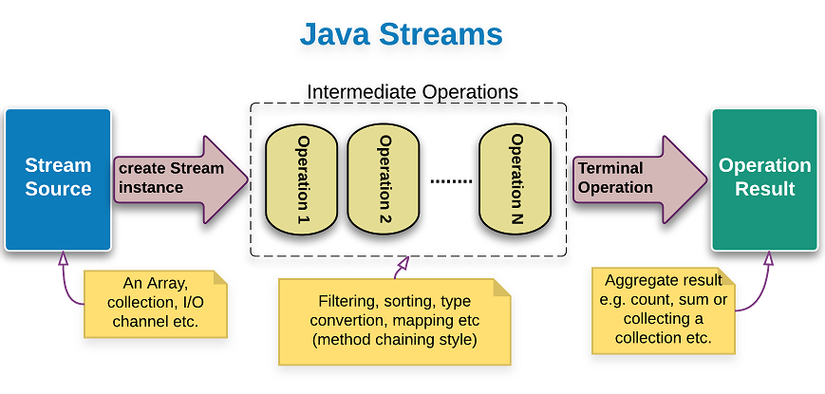Unveiling the Power of Java Streams API
Bài đăng này đã không được cập nhật trong 2 năm
In the world of programming, efficiency and readability are two very important factors. The Java Streams API is a remarkable addition to the Java ecosystem that empowers developers to write concise, efficient, and expressive code for data manipulation and processing.
In this comprehensive guide, we will go through the details of Java Streams, highlighting their importance in modern Java development. We will also explore why enrolling in a Java training course in Faridabad, Rohtak, Jabalpur, Bangalore, Noida, and various other Indian cities is crucial to truly master this transformative feature.
The Java Streams Advantage
**Before we delve into the depths of Java Streams, let us first understand why they have become a game-changer in the world of Java programming. **
-
Code Clarity: Java Streams allow developers to express complex data transformations and manipulations using high-level, declarative operations. This leads to code that is more readable and maintainable.
-
Conciseness: With Java Streams, you can accomplish tasks with significantly less code compared to traditional imperative loops. This brevity not only makes your code cleaner but also reduces the chance of introducing bugs.
-
Parallelism: Java Streams seamlessly support parallel processing. This means you can leverage multi-core processors to enhance the performance of your applications without writing intricate multi-threading code.
-
Functional Approach: Streams encourage a functional programming style, which emphasises immutability and pure functions. This style leads to code that is less error-prone and easier to reason about.
-
Interoperability: Java Streams can be used with collections, arrays, I/O channels, and more. This versatility allows you to apply the same stream operations to a wide range of data sources.
An In-Depth Look at Java Streams
**Now that we have recognized the advantages of Java Streams, let's explore the core concepts and functionalities. **
- Stream Creation
Streams can be created from various data sources, including collections, arrays, I/O channels, and generators. For instance, you can convert a list of elements into a stream using list.stream().
- Intermediate Operations
Intermediate operations are operations that transform a stream into another stream. Examples include filter, map, and sorted. These operations are typically chained together to create a pipeline of transformations.
- Terminal Operations
Terminal operations are operations that produce a result or a side-effect. Examples include forEach, reduce, and collect. Terminal operations are essential to trigger the processing of elements in a stream.
- Parallel Streams
One of the standout features of Java Streams is the ease with which you can leverage parallel processing. By invoking parallel() on a stream, you enable parallel execution of stream operations. This can significantly boost the performance of CPU-intensive tasks.
- Common Stream Operations
- Filtering: Use
filterto select elements from the stream based on a condition. - Mapping: The
mapoperation transforms elements from the stream into another form. - Sorting:
sortedarranges the elements of the stream based on a provided comparator. - Reduction: Operations like
reduceallow you to perform aggregations on the elements of the stream. - Collecting:
collectis often used to accumulate the elements of a stream into a collection or to produce a single result.
- Error Handling
Java Streams provide robust error handling mechanisms. For instance, you can use orElse and orElseThrow for handling potential null values.
Why Pursue a Java Training Course?
While Java Streams offer a powerful and efficient way to process data, mastering them requires a deep understanding of Java fundamentals. Enrolling in a best Java training course in Faridabad, Rohtak, Jabalpur, Bangalore, Noida, and various other Indian cities can be immensely beneficial for the following reasons:
-
Structured Learning: Java training courses follow a structured curriculum that covers the Java language from the basics to advanced topics like Java Streams. This step-by-step approach ensures a solid foundation.
-
Expert Guidance: Experienced instructors can provide valuable insights into best practices, design patterns, and advanced Java concepts. They can guide you in mastering Java Streams effectively.
-
Hands-On Practice: Courses typically include hands-on coding exercises and projects that allow you to apply Java Streams concepts to real-world scenarios. Practical experience is crucial for proficiency.
-
Comprehensive Resources: Java training courses provide access to a wealth of resources, including textbooks, coding exercises, and libraries, which can aid in your learning journey.
-
Networking Opportunities: Joining a course connects you with a community of fellow Java enthusiasts. Networking can lead to valuable collaborations and career opportunities in the Java development field.
-
Career Advancement: Java is a widely used programming language in the software industry. Completing a Java training course enhances your skills and employability, opening doors to rewarding career opportunities.
Conclusion
Java Streams have revolutionized the way Java developers work with data. They offer a concise, efficient, and expressive means of data manipulation and processing. However, to unlock their full potential, it's crucial to have a strong foundation in Java programming. Enrolling in a Java training course in various cities across India not only equips you with the knowledge and skills but also positions you for a successful and fulfilling career in Java development.
In the ever-evolving world of programming, mastering Java Streams is a skill that can set you apart as a proficient and efficient developer. So, embark on this journey, explore Java training courses available in your city, and take your Java programming skills to new heights with the power of Java Streams.
All rights reserved
